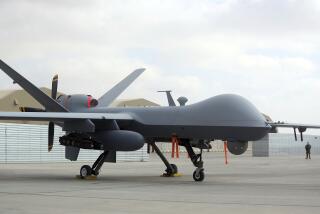Army Officers Warn Both Sides in Moldova Rift
- Share via
MOSCOW — Officers of a former Soviet army unit stationed in an embattled Slavic region of Moldova warned both sides in the conflict there Thursday that they will order their soldiers to assume “full combat alert” unless the two belligerents pull back their forces and stop the bloodshed.
The warning came a day after Moldovan police attacked Slavic Dniester guards in Bendery, a town in the self-styled Dniester Moldavian Republic, a region seeking to break away from the former Soviet republic of Moldova. At least 10 people, three of them civilians, were killed in the violence, according to Vladimir M. Rylyakov, chairman of the local security and defense committee.
Late Thursday, a Dniester spokeswoman said Moldovan Prime Minister Valery Muravsky and Trans-Dniester Parliament Speaker Grigory Marakutsa reached agreement on a cease-fire.
Chairman Alexander Moshan of Moldova’s Parliament said that the foreign ministers of Russia, Ukraine, Moldova and Romania will meet in the Moldovan capital of Kishinev today to devise a strategy to restore calm to the region, which has suffered sporadic outbursts of violence for two years, according to the Russian news agency.
Thursday’s military warning to the two sides in the Dniester conflict was issued by the officers of the 14th Army, which Russian President Boris N. Yeltsin took under Russian control Wednesday.
Maj. Gen. Vyacheslav Sitnikov, chief of staff of the 14th Army, told Russian news agencies that he welcomes Yeltsin’s decision to transfer his unit to Russian jurisdiction. Sitnikov said that a specialized military unit is needed to act as a buffer between the two sides in the conflict.
“A force is needed to stop the armed clashes between the Moldovan police and the Dniester guards,” Sitnikov told the Russian Information Agency.
But Moldova’s deputy defense minister, Maj. Gen. Pavel Kryange, denounced Yeltsin’s move as a graphic example of Moscow intervention in Moldova’s affairs.
The conflict is politically awkward for Russia, which recognizes Moldova’s sovereignty but feels responsible for the 60,000 ethnic Russians and Ukrainians who live in the Dniester region. The region has proclaimed its independence from Moldova, but neither Russia nor Moldova has recognized it.
More to Read
Sign up for Essential California
The most important California stories and recommendations in your inbox every morning.
You may occasionally receive promotional content from the Los Angeles Times.













